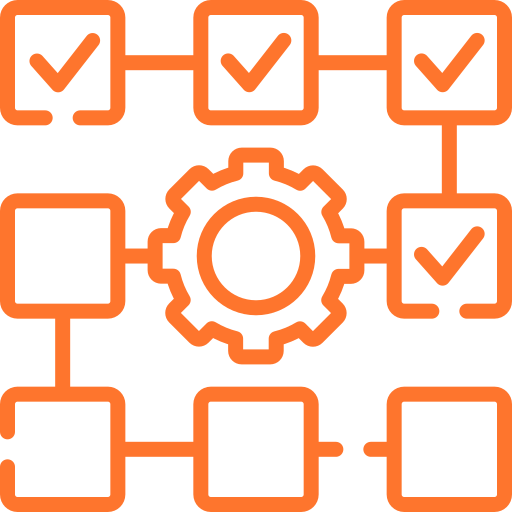Search Engine Optimization (SEO):
Boost Your Online Visibility
Welcome to the comprehensive guide on Search Engine Optimization (SEO)! In the digital age, optimizing your website for search engines is essential for increasing visibility, driving traffic, and growing your business. This page covers the key components, strategies, and tools you need to master SEO and achieve top search engine rankings.

Key Components of SEO
Keyword Research On-Page Optimization Content Creation Technical SEO Link Building Local SEO
Keyword Research

- Objective :
Identify relevant search terms that potential customers use.
- Techniques:
- Tools: Use tools like Google Keyword Planner, Ahrefs, and SEMrush.
- Analysis: Evaluate search volume, competition, and relevance.
- Long-Tail Keywords: Focus on specific, longer phrases that have less competition.
On-Page Optimization

- Objective :
Improve the content and HTML of your website to make it search engine friendly.
- Techniques:
- Title Tags: Craft compelling, keyword-rich titles.
- Meta Descriptions: Write descriptive meta tags that encourage clicks.
- Header Tags (H1, H2, H3): Structure content with appropriate headers.
- URL Structure: Use clean, keyword-optimized URLs.
- Internal Linking: Link to relevant pages within your site to enhance navigation and SEO.
Content Creation

- Objective :
Produce high-quality, valuable content that attracts and retains visitors.
- Formats:
- Blog Posts: Regularly update your blog with informative articles.
- Guides and Tutorials: Provide in-depth information on relevant topics.
- Infographics: Create visual content to simplify complex information.
- Videos: Engage users with visual and auditory content.
Technical SEO

- Objective :
Ensure your website meets the technical requirements of search engines.
- Techniques:
- Site Speed: Optimize loading times for better user experience and ranking.
- Mobile-Friendliness: Ensure your site is responsive and mobile-friendly.
- Structured Data: Use schema markup to help search engines understand your content.
Link Building

- Objective :
Acquire high-quality backlinks to improve your site’s authority and rankings.
- Techniques:
- Guest Blogging: Write for other blogs to get backlinks.
- Outreach: Contact influencers and webmasters for link opportunities.
- Content Marketing: Create shareable content that naturally attracts links.
- Directories and Listings: Submit your site to relevant directories and listings.
Local SEO

- Objective :
Optimize your online presence for local search results.
- Techniques:
- Local Keywords: Use keywords specific to your location.
- NAP Consistency: Ensure your Name, Address, and Phone number are consistent across all platforms.
- Local Reviews: Encourage satisfied customers to leave positive reviews.
Keyword Research

- Objective :
Identify relevant search terms that potential customers use.
- Techniques:
- Tools: Use tools like Google Keyword Planner, Ahrefs, and SEMrush.
- Analysis: Evaluate search volume, competition, and relevance.
- Long-Tail Keywords: Focus on specific, longer phrases that have less competition.
On-Page Optimization

- Objective :
Improve the content and HTML of your website to make it search engine friendly.
- Techniques:
- Title Tags: Craft compelling, keyword-rich titles.
- Meta Descriptions: Write descriptive meta tags that encourage clicks.
- Header Tags (H1, H2, H3): Structure content with appropriate headers.
- URL Structure: Use clean, keyword-optimized URLs.
- Internal Linking: Link to relevant pages within your site to enhance navigation and SEO.
Content Creation

- Objective :
Produce high-quality, valuable content that attracts and retains visitors.
- Formats:
- Blog Posts: Regularly update your blog with informative articles.
- Guides and Tutorials: Provide in-depth information on relevant topics.
- Infographics: Create visual content to simplify complex information.
- Videos: Engage users with visual and auditory content.
Technical SEO

- Objective :
Ensure your website meets the technical requirements of search engines.
- Techniques:
- Site Speed: Optimize loading times for better user experience and ranking.
- Mobile-Friendliness: Ensure your site is responsive and mobile-friendly.
- Structured Data: Use schema markup to help search engines understand your content.
Link Building

- Objective :
Acquire high-quality backlinks to improve your site’s authority and rankings.
- Techniques:
- Guest Blogging: Write for other blogs to get backlinks.
- Outreach: Contact influencers and webmasters for link opportunities.
- Content Marketing: Create shareable content that naturally attracts links.
- Directories and Listings: Submit your site to relevant directories and listings.
Strategies and Tactics

Establish clear, measurable objectives (e.g., increase organic traffic, improve keyword rankings).

Regularly perform audits to identify and fix SEO issues on your website.

Develop a plan for consistent, high-quality content creation.

Use tools like Google Analytics and Google Search Console to track and analyze performance.

Ensure your site is optimized for mobile devices to improve user experience and rankings.

Promote your content on social media to increase visibility and attract backlinks.

Interact through social media, comments, and other channels.

Keep up with the latest SEO trends and algorithm updates to maintain and improve your rankings.
Essential Tools and Platforms
Google Analytics Google Search Console Ahrefs SEMrush Moz Yoast SEO Screaming Frog

















Mastering SEO involves understanding its components, implementing effective strategies, and utilizing the right tools. Whether you’re a seasoned marketer or just starting, these insights will help you navigate the SEO landscape and achieve your business goals. For further information or assistance, feel free to contact us!
